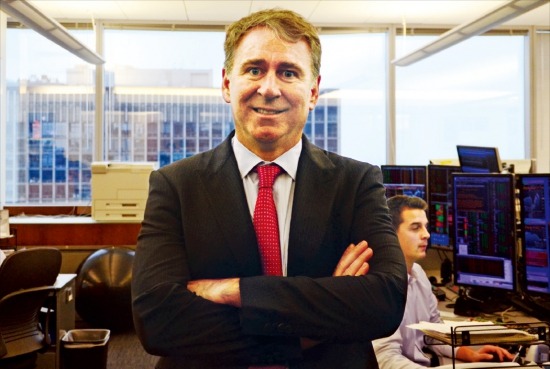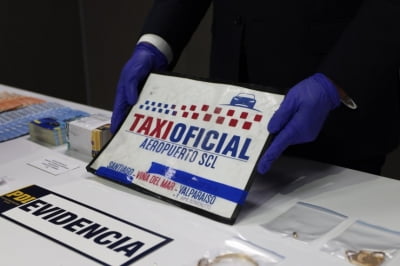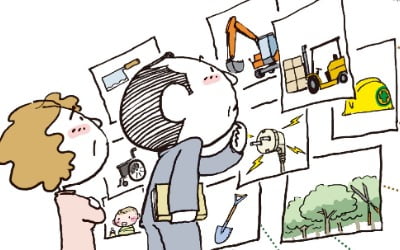
“The US economy is doing well. The unemployment rate has come down to a point where it seems likely the Fed will begin to raise interest rates. I believe the Fed will approach this in a thoughtful manner so as to not create the impression that monetary conditions are being tightened too quickly, which could curtail future growth.”
▶How do you see the global economy?
“The whole notion of a “world economy” is somewhat of a misnomer. Economies around the world are performing very differently from continent to continent, and country to country. Global growth is suboptimal. The US economy is recovering but more modestly than hoped. Europe is still struggling following the aftermath of the financial crisis of 2008 and the sovereign debt crisis of recent years. Japan would benefit from labor market and industry reforms. The Japanese government should implement these reforms to bring needed growth to their economy. Investors are anxious about the lack of growth around the world.”
▶Volatility came back to the market. Do you see any opportunity to earn money in this market?
“I think it’s important to differentiate between trading and investing. There are ample opportunities to provide liquidity in this market environment but these opportunities disappear very quickly. I believe institutional investors and retail investors would benefit more from focusing less on trading opportunities and more on where they can invest capital to generate healthy risk adjusted returns for years to come.”
▶Do you have any recommendations for retail investors?
“In this market environment, blue chip equities present investors with some of the best value in the world. Likewise, retail investors should continue to look at companies in Europe, Asia and the Americas with strong earnings, driven by globally recognized brands or unique intellectual property that demonstrates a commitment to sharing their success with their shareholders.”
▶But investors and other market participants have been saying that stock prices are too expensive nowadays.
“The US equity market is certainly not cheap. One of the challenges you have as an investor is that the Fed encouraged risk taking through their very accommodative monetary policies. As a result, expected returns from these assets (i.e. stocks) are, in general, mediocre. This is a challenge that investors face in many of the developed economies.”
▶Bond prices are also expensive.
“Bond yields have been extraordinarily low for several years. If there is another global slowdown, investors may be rewarded by owning longer dated bonds. However, if global economies start to accelerate in 2015, and monetary policy is tightened, fixed income investments will suffer.”
▶Fed is expected to raise its interest rate 2015. Why do people still hold the bonds?
“Investors tend to buy and hold what has worked in recent years. This is universal behaviour amongst investors. Unfortunately, that’s also part of what creates boom and bust cycles in the market.”
▶Citadel lost about 50% of its capital in the 2008 financial crisis. What went wrong?
“We were one of the largest ‘non-bank banks’ in the world. Our balance sheet was very large. When the financial crisis struck the banking system, many large banks were forced to sell assets in distressed sales. The collective selling by market participants reduced the value of our holdings on a mark-to-market basis. Fortunately, we were able to maintain a substantial portion of our holdings and we ultimately weathered the storm. I certainly didn’t foresee the implosion of the US and European banking system. But we have learned from the bitter lessons of 2008, and have taken measures to reshape our business. Today, we have a very different portfolio focused on liquid markets and securities.”
▶You built a risk management center like a war room. Why?
“We must constantly focus on capturing market opportunities and protecting our investment capital. Our risk management systems provide us with the ability to conduct stress test analyses in real time and transparency into the risks we are taking across our portfolios. It empowers us to make better decisions while we pursue our dual mandate of capital appreciation and capital preservation.”
▶What have been the key drivers of success for Citadel?
“What drives our success is the hard work of our teams. As a market neutral hedge fund, we spend an extraordinary amount of time conducting bottom up fundamental analysis to identify undervalued assets around the world. Each year, our equities team, for example, engages in more than 10,000 management meetings to identity compelling companies to invest in.”
▶What is the role of hedge funds in the market places and the economy?
We put capital to work every day across a variety of investment strategies. Over the years, hedge funds have grown increasingly important in the global capital markets. The investments that hedge funds make in companies help to create jobs, goods and services that people want and need. Companies have benefited by being able to raise more capital more quickly at a lower cost. The hedge fund industry has certainly evolved from when I started out 25 years ago trading convertible bonds.
▶Hedge funds take a role in making markets more efficient?
“Absolutely. Index funds and ETFs are incredibly important today. When you buy an ETF, you buy a basket of stocks. You can access specific sectors or the market as a whole, in a cheap and efficient manner. Usually, you’re not spending time researching every one of those companies. Research conducted by buy-side firms helps to ensure the prices of the stocks in the basket are reasonable and fair. Markets today are better, faster, cheaper and more equitable than ever before.”
▶Sometimes, the market is irrational.
“The history of humanity has been punctuated by boom and bust cycles, greed and fear. Until we change our DNA as a species, we will see this happen again and again. It’s important to have a diversified portfolio to help weather volatility and difficult market cycles. Being a successful investor over the long run doesn’t mean you chase what has gone up recently. You need to be diligent and well positioned to take advantage of distressed opportunities.
▶You’re against big government. Why?
“I firmly believe that the free enterprise system that exists across most of the world today has created incredible prosperity. Our free market system encourages risk taking, the pursuit of novel and new ideas, innovation, disruptive technologies and the creation of goods and services. Well-functioning capital markets, a very active venture capital community, and entrepreneurs create the vast majority of innovation in our society. For example, look at the incredible innovations in energy extraction. The United States is now the largest producer of oil in the world. If I said 20 years ago that the US will produce more oil than Saudi Arabia early in the next century, many people would have laughed. The free enterprise system creates innovation that changes our lives. Government has a role – educating our children, providing for national security, enforcing our laws – but it is a limited role, one that leaves room for entrepreneurs, innovators and those willing to work hard to better themselves, their families, their communities, and society.”
Chicago=Chang Jae Yoo / Simgi Lee yoocool@hankyung.com



![생성AI 탑재한 20만원짜리 스마트 안경 나왔다 [Geeks' Briefing]](https://img.hankyung.com/photo/202412/01.38925509.3.jpg)
![[포토] 울릉도 프리미엄 먹는 샘물 '울림워터' 출시](https://img.hankyung.com/photo/202412/01.38925052.3.jpg)




